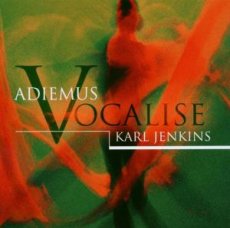|
(19 October 2003) Vocalise, (EMI Classics (UK) 5576492, 2003) the fifth studio album by Adiemus marks a significant departure in the series of Adiemus albums. When listening to the album, these changes immediately become apparent. As a long-time Adiemus fan, these changes are impossible to ignore and therefore have become the basis of this review. The most significant departure is that the original voice of Adiemus, Miriam Stockley, is no longer a part of the project. While the other Adiemus players--composer Karl Jenkins, the Finnish Adiemus singers, the London Philharmonic Orchestra and instrumentalists such as Pamela Thorby and Martin Taylor--remain in place, Miriam Stockley's absence leaves a great emptiness in the Adiemus sound. Stockley's voice has an amazing dynamic and range, taking songs from exuberant tribal chants to quietly soothing interludes, and the previous Adiemus albums made good use of this voice. Without Stockley, the Adiemus vocals are far more shrill, less sensual, and less warm. The album suffers from it. Songs such as "Allegrettango"” could have benefited from Stockley's lower range to balance out the sound. Guest singers such as Belinda Sykes and Terence Barber are greatly talented, but Adiemus songs without Stockley's voice are simply lacking. The second departure is the use of true language on the album, rather than solely relying on meaningless vocal sounds. This change is not too jarring when the languages are Punjabi, Portuguese, or Latin, but the one song sung in English--"The Protector"–-sounds like a plain and simple choral piece, not like a true Adiemus song. The third departure is the experimentation with new musical sounds. The original Adiemus album featured grand, majestic melodies. The serenity of these songs provided much of the appeal for many Adiemus fans.Slowly, composer Karl Jenkins has introduced other influences on recent Adiemus albums, most notably the more jazz-oriented sounds on The Eternal Knot. This development is taken furter on Vocalise, where jazz sounds--both vocal and instrumental--are pushed to the fore on such songs as "Dona Nobis Pacem Part II" and "Mi Contra Fa, DiaBolus in Musica." The result is not always successful, as jazz-improvisation does not result in the same grand melodies Adiemus is known for. Other innovations such as the Lisa Gerrard-soundalike "Dona Nobis Pacem Part I," the happy folk music sounds of "Schwanda The Bagpiper" and its companion piece "Exit Schwanda," as well as the eastern influenced "Mysterious Are Your Ways," are much more successful in pushing the Adiemus sound in new directions. As for the album's final track--"Boogie Woogie Llanoogie"--it sounds as ridiculous as its name suggests. The final departure is that on this album Jenkins has adapted other composers' works to the Adiemus sound rather than compose each piece himself. Some of the adaptations work reasonably well. "Rondo" (after Beethoven), the already mentioned "Schwanda The Bagpiper" (after Weinberger), and "Aria" (after Villa-Lobos) are creative interpretations of existing pieces using the Adiemus sound. The album's title track "Vocalise" (after Rachmaninov) offers quiet serenity. "Allegrettango" (based on Beethoven's 7th Symphony) is an interesting interpretation with good instrumentation choices, but the vocals are shrill and the eventual fade of the song makes it seem as if Jenkins could not figure out how to properly interpret the song. One of the best adapted pieces on this album was originally composed by Jenkins himself: "Bendigedig" is a new recording of the song “Good Night, House of Dewi” from the Dewi Sant album. The song's finale is obviously drawn from the Adiemus track "Beyond The Century." This song is most reminiscent of the earlier Adiemus albums and is likely to please longtime Adiemus fans. So in the end, Vocalise is a mixed bag, lacking the thematic consistency of earlier Adiemus albums. Jenkins is to be commended for not resting on his laurals, doing the same thing over and over again, but rather wanting to try something new. In some cases, this experimentation results in some great new Adiemus songs and a wonderful progression of the Adiemus sound. Other attempts, however, are less successful. Vocalise is likely to stir up a lot of discussion among Adiemus fans--at least until the next Adiemus album is announced.--Paul van Vliet Read further reviews, listen to soundbites and orderthe album from amazon.comhere. An album certain to interest long time Adiemus fans inits development from previous works and introduce thematerial to new listeners, further investigation is certainly worth a journey. An album certain to interest long time Adiemus fans inits development from previous works and introduce thematerial to new listeners, further investigation is certainly worth a journey. 
|






